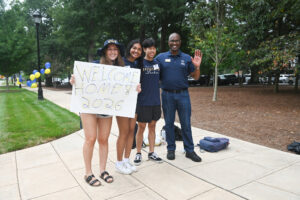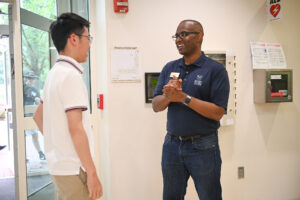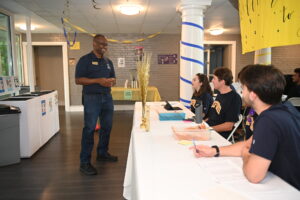Belonging, care, accountability, presence, learning and identity. These are the six student-inspired principles that University of Oxford College of Emory Interim Dean Dr. Kenneth Carter has elevated to the faculty level to reignite the community… and it’s working.
Oxford College is one of nine different schools that make up Emory University. According to Carter, most students enroll at Oxford for the first two years of their undergraduate program and continue on to Emory to complete their degree.
Being a rather small college, there are around 28 students in its largest classes. Carter says they try to keep their student-faculty ratio to about 1:10.

From a faculty perspective, students flourishing is one of the most important goals among Oxford leaders. For Carter, his background puts him in a unique position to support his student body.
“I went to Oxford College when I was an undergraduate student,” he says. “I think I may be the only dean that has been a student, a faculty member and now in administration. I feel like I see the school from all of the different viewpoints. On the very first day of move-in, I went on a tour of the residence halls and helped people move in. I got to see my old dorm room and I pointed out on the wall where the pay phone used to be.”
Having that experience, he explains, helps him to understand the students’ perspectives while also being able to meet the needs of the college’s faculty. “Colleges are complex institutions, and so the ability to empathize with alumni, current students, faculty and staff really puts me in a unique position this year.”
Carter also has a background in psychology, to which he credits much of his ability to implement strategies to improve the well-being of his students and faculty. “For me, being a psychologist is part of my identity,” he says. “I worked a lot with Chris Peterson, who was one of the founders of the positive psychology movement. That’s the idea of using psychological principles to help people lead happier lives. I think a lot of things that we’re doing are using those principles of psychology to focus on what people need right now.”

Fortunately, he explains, the students have already developed a framework that helps guide his work and that of his colleagues. The six principles listed earlier are what’s known as the Oxford Principles. During the pandemic, students were asked to think about what they desired in a post-pandemic world and what norms they would like to implement in their community.
“These are sort of student-driven principles that we’ve adopted as community principles for faculty and staff as well,” Carter says. “This year, one of the things I did was challenge the community to focus on one of these principles each month. The first month we focused on belonging and I challenged everyone to think of something that they can do to help another person feel like they belong in this community.”
During their new faculty orientation, he asked each new member what goals they’ve set for themselves this year. Whether it’s introducing themselves to a student each day or sitting at a table with strangers, every effort brings the campus closer to its mission.
“To me, if you have one person doing that, it’s incredible,” he says. “But when you have an entire community focused on that, it can really change the nature of things. Taking this focus that students created and elevating it for the community I think is part of what’s making a difference in terms of reigniting the community and helping people feel like this is a place where they belong.”
Carter took the helm in August, a rather pivotal time in education as many in higher ed hope that this is the first year of normalcy since the pandemic. He accepted the position with the understanding that he would not apply to be the permanent dean. Doing so, he believes, will allow him to fully commit to pursuing his goals for the college and meeting the needs of his students and staff.
Since the pandemic, he noticed that there was a great deal of burnout among the campus community, although they weathered the height of the pandemic better than most, he says. However, Carter has brought forth four new initiatives that have helped to increase engagement, bring more people to campus and create a sense of lightness, according to feedback he’s received from students and staff.
First and foremost, he strives to deliver the college’s educational mission by focusing on what’s essential. Secondly, in order to set the next dean up for success, he implemented what he calls “stocktaking,” noting, “We want to make sure we understand who we are as a community and what’s important to us, but also what are the challenges that are coming up ahead of us?”
Third, he wants to combat a product of the pandemic that plagues many higher education institutions: burnout. “What I think some people do when they try to combat is to isolate, and as a psychologist, I know that isolation is not the thing that’s going to help with burnout at all.”
Lastly, and possibly most importantly, Carter believes in reigniting his campus community.
“Oxford is a very small college with around 1,000 undergraduates for those first two years, but a very tight-knit community,” he explains. “But I think the community took a little bit of a toll during the height of the pandemic. We created course schedules to keep people away from campus. But I didn’t want to require people to come back to campus. I wanted to make sure there was some flexibility for staff. What I wanted to do was give people a reason to want to be back.”
One unique way they’re creating incentives for students and staff to be present on campus is by getting rid of two hours of instruction each week and dedicating that time to campus-wide events.

“On Wednesdays from 1:00 to 2:15 is a very popular time to teach, but we’re not going to have classes,” he says. “We’re going to do things on the quad, we’re going to have dance parties, we’re going to have all sorts of different things to bring the community back together.”
What’s extraordinary, Carter explains, is the willingness of faculty members to unanimously agree not to teach if it means creating a welcoming and positive school environment.
“I think that’s the kind of place Oxford is,” he says. “We’re really focused on teaching, we’re focused on the student experience, we’re laser-focused on students flourishing. Everyone comes to Oxford—students, faculty and staff—to build an environment where students can flourish. When you create a structure where that’s easier for people, I think people will step up and do it.”
More from UB: How do colleges hit record-level fundraising? It’s all about the alumni






